#While abusive individuals can use the topic to hurt people
Text
When something bad happens to someone who follows a lifestyle I like, it's a bug. When something bad happens to someone who follows a lifestyle you promote, it must be a feature and proof that you are evil.
#ventposting#People can manipulate impressionable individuals into abusive situations with anything. Literally anything.#It is not proof that the thing the abuser uses is evil.#How about let children make their own decisions about their gender. There is no unified trans agenda to force children to transition.#While abusive individuals can use the topic to hurt people#It is not proof that transgenderism is evil.#Every time the topic of trans kids comes up#I don't want to hear the adults' opinions and fears#I want to hear what the child thinks and whether they're informed.#I want dry boring in-depth analysis and children being respected.#Not clickbait articles.
0 notes
Text
PAC: How to overcome your fears regarding relationships?
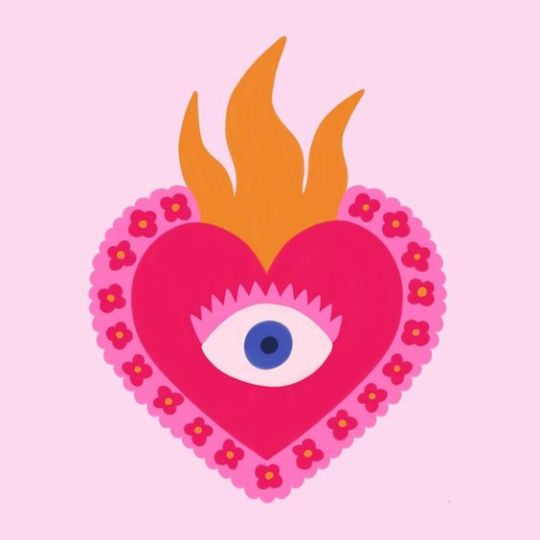
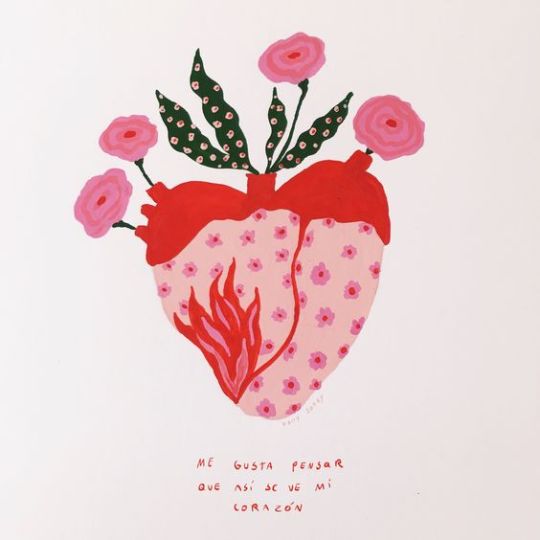

Hey :p
Here is a new love pick a card about a topic I've personally been struggling with recently, so I really wanted to dive into it.
The goal of today's reading is to look at what fears you're dealing with in matters of relationships; fears that might manifest as blockages or obstacles in your love life; and how to overcome them.
As always, this reading is meant for multiple people and there are only three piles, so take what resonates and leave out the rest. It can help focusing on your issue or a specific relationship while selecting the pile.
I offer paid readings as well, don't hesitate to reach out to me in DMs.
Ko-fi ★ book a reading ★ pinned post ★ instagram
PILE 1
Cards: 3 of Swords, 9 of Pentacles, King of Wands, Queen of Wands, Slow Down, King of Pentacles, Manic, Queen of Swords, King of Cups, Queen of Cups, 2 of Pentacles, 5 of Pentacles, the World, 7 of Wands, the Magician, the Emperor
Your fears surrounding relationship have to do with heartbreak and loss. It seems you've had your heart wounded deeply in the past. The pain was intense and it took you so long to sooth it, and you had to use all your resources to revive yourself from this state. You had to learn to be independent and flourish for your own sake, to tend to your own inner garden and make a life beautiful and enjoyable for yourself. So you not only are scared to get your heart broken again, but also to lose your individuality and the peace you built for yourself. I think you are attracted to people like you, strong individuals with ambition and passion, but you're scared it's going to get in the way of your own path and vision and lead you apart, breaking your heart once more. I believe you overthink quite a lot and expect things to go wrong before they even do.
These fears are rooted in your relentless mind, forever going full speed from one extreme to the other, in a frenetic quest for meaning and movement. It seems you have trouble feeling satisfied by anything for long because you're always looking at the next adventure, the next prize, the next achievement. It's not that you're ungrateful or anything, but rather, that you are scared you're going to be left with nothing if you stop trying to fix what's wrong in your life. You keep looking for problem to solve, perhaps due to your triggered survival instinct, and it's hard for you to stop and appreciate what you have. So the root of your fears is in your own mind, in the pathways you built years after years and that you solidified. It seems you have a hard time finding your balance, go with the flow and stay in the appreciation of the present.
These fears manifest in relationships by a hard grip on your feelings by your mind. See, your feelings are strong and run deep, and they can get overwhelming very easily. As a result, you react by dissecting them like some freaky science experiment and try to break everything down to understand them, but also to keep them under the control of your logic. It's kind of a toxic pattern, an abusive move from yourself towards yourself. Your words can be harsh and hot tempered because you feel hurt easily and can blow things out of proportions fast. You're so scared of losing your agency and getting hurt that it makes you hyper aware of every little blow at your heart and you go to war a bit too easily. I'd also say that paradoxically, you have a hard time being honest about your feelings and communicating them in a gentle and open way. You may even wait till things become unbearably painful before saying anything, instead of acting earlier when the need arose the first time. You struggle with the idea of vulnerability a lot and perhaps your way around that is to wait till it feels like it's the other person's fault for hurting you instead of your own inability to express yourself authentically.
For what external influences play a part here, I'd say first that you have a strong personal sense of what you need from life and relationships, but that you doubt yourself a lot. You keep comparing yourself to what others have, or what society expects and this is making you feel depleted and resource-less. It's like, people say one thing, and you know it's wrong, but for some reason you keep entertaining the idea even though you know it's rotten and useless for you. In addition, you also feel pressed by time, as if you felt you were following some type of transcending schedule you had to abide by, and if you are late or out of sync, then that means you are failing and it's causing your fears to intensify. This is making your fears worse because these expectations weight on your mind and make you feel broken and worsen you destructive patterns.
For how to overcome your fears, your first need to let go of the struggle mindset. No, life is not out there to get you and you aren't going to lose everything if you dare opening up to love. You are too defensive of your heart and too combative in your approach. You need to replace that mindset by bringing all elements of yourself in harmony. Your mind shouldn't fight your emotions, your passion shouldn't clash with the respect of your boundaries. What I'm trying to say is to take a look at what you're over-doing and what you're neglecting, and bring some balance within yourself. You must also bring clarity in your mind about what it is you want and hold the vision, knowing that you will find what you need when the right opportunity arises. Also, don't hesitate to advocate your your needs and wants. Not like a tyrant, but like someone who knows themselves and know what's best for them, and go after whom they desire without fear. Yes, the battles of the heart are scary and it can be hard to go for what you want due to the fear of loss and pain, but you need to make a conscious decision to not only open up, but also let the other person know where you stand. Trust in your magic, your skills and power, you have everything that you need to succeed.

PILE 2
Cards: 4 of Swords, the Magician, the Star, Inner Awareness, Let Go rx, Queen of Pentacles, the Fool, 5 of Swords, 10 of Cups, Jealousy rx, Optimism, Queen of Cups, Page of Wands, 3 of Pentacles, Death
Your fears regarding relationship come up as fearing your hopes and dreams won't manifest. You are a romantic, a dreamer who has a beautiful and idealistic idea of what love can and should be, but you're struggling to find it. You may currently be in a state of isolation and afraid of it will never end, and that you'll be missing out on the joys of love. You are highly in tune with your higher desires, have a strong faith in the vision you have for the relationship you dream of, however, you're also highly scared that this will not become a reality, because you worry you do not have what it takes to reach your dream. I'd also say you're painfully aware of you own flaws and issues, and you worry you won't be accepted as you are.
The root cause of these fears shows up as a struggle to let go of your need to control and predict when the situation would require to simply take a step forward and embark on an adventure without worrying about the future. You may have been neglecting your love life for a while before this moment, not leaving enough space for relationships to bloom, because you perceived it as a treat for your well being at the time, which might simply mean that you hadn't met the right person or at the right time, and I think it shows up here because these disappointments made you very wary and careful about love and it's holding you back presently.
These fears manifest in your relationships by placing too high of an expectation from the get go on them. This gap between reality and dream is putting pressure on the relationship and on yourself. You may see the relationship as failing and struggling to communicate because you feel so vindicated. You might know that your approach is not working, but failing to understand why, and thinking things were not meant to be as a result, circling back on this idea of fated and perfect love. You may also compare the relationship to the ideal in your mind excessively, which is creating even more tension, anger and frustration, because it doesn't match your ideal.
For the external influences, it seems your current mindset was shaped by an environment that didn't encourage honest and authentic communication of your emotions, needs and desires. Paradoxically, you were told to always remain optimistic and hopeful, that things would always work out without effort, but without giving you the keys to how to work towards that in reality. It's as if it fed into your dreamy nature without allowing you to understand how to build the bridge between dream and reality. You didn't learn the power of your actions and how to take accountability for them, which is again feeding this imbalance between your inner world and the reality of a lived relationship. Also, circling back on the fear of not being accepted I highlighted in the first paragraph, this is also linked to your lack of skills in communication, because you expect people to understand you without having to express yourself, which is unfair to them.
For how to overcome these fears, the cards point at a few things. First, we're being led back to this idea of embarking on an adventure, with passion and confidence, and stepping out of your comfort zone. You must learn that the way you are approaching things is not working and need a deep transformation. You must learn from the mistakes of your past and start anew. Look at the future with hope but take actions toward what you desire. Also, keep in mind this idea that building a relationship requires team work and constant effort, and that things will not always be perfect and dreamy. Some days will be hard, but it doesn't mean they will never be sweet. Be open minded and enthusiastic and learn not to draw hasty conclusions on the relationship or on your person.

PILE 3
Cards: 3 of Pentacles, Page of Pentacles, 10 of Wands, Joy rx, 10 of Pentacles, 10 of Swords, 7 of Pentacles, King of Wands rx, King of Pentacles, Ace of Pentacles, 2 of Cups, 8 of Wands, Forgive rx, Intuition rx, 4 of Pentacles, the Hermit, Knight of Cups
Okay so heads up, this file feels a bit like the results of your own doing.
Your fears regarding relationships have to do with the idea of being burdened with responsibilities and losing access to the usual ways you find joy in life. I'm getting strong fear of commitment. That a committed relationship could get in the way of your present social life, friends and party habits. I see you quite mesmerized by what looks like glitter, as in, what seems attractive and exciting in the moment, which makes you ignore everything else that is around it because you're so fixated on what's in front of you. Basically, it seems like a lot of work and sacrifices for a reward that seems unsure and unsatisfying, and you fear that.
This is all rooted in what seems to be a fear of endings, as in, you fear closing a chapter of your life, both because of the pain of closing such chapter will cause (grief for a time of your life that is gone), as well as for the loss of the pleasures that come with it. You also fear things slowing down and being out of your hands, that your happiness won't depend from your own will only anymore and that you would have to work for it with someone. However, you of course don't see that behind every ending is a new beginning, and that things might not be as clear cut and as desperate and you imagine them to be. It's a bit over dramatic I feel.
This manifest in relationship by a bit of a toxicity if I'm completely honest. The cards point at rigidity and stubbornness as well as pent up anger and passive aggressiveness towards your partner. You might get fed up of them easily, because you feel restricted in your freedom. There is an inability to look past your own trauma and you're pushing its patterns onto your partner instead of addressing them directly. You end up hurting the both of you on the process.
For the external influences, I feel like there may be a connection that is triggering all these wounds for you here. Perhaps someone you were not expecting, someone who wish to come into union with you, to communicate freely and to make you a solid romantic offer. You sense that and it's making you spiral. This connection is putting pressure on you by asking you to make amends with the way you act and to own up to your bullshit (sorry). It may also trigger your intuition that is trying to tell you something, which you are refusing to listen to.
How to overcome these challenges then? The cards point at a need for a deep, thoughtful introspective journey, which will lead you to let go of your resistance to change. You're currently holding everything in, and I'm getting the image of a dam that is about to break down, little cracks growing and growing, and you're trying to cover them with your hands, but it's a losing battle. You need to learn to come forward, be vulnerable and authentic with your feelings and move towards what calls your heart without negating your deeper feelings and intuition. Make amends to you heart and pay attention to its whispers.
#pick a card#pick a pile#tarot reading#love tarot reading#love reading#divination#tarot#tarotblr#tarot community#soaringwide#soaringwide tarot reading
255 notes
·
View notes
Text
(Warning for this post I'm half asleep so I might be incoherent or have disjointed topics. Bare with me, I'm trying to express my thoughts the best I can.)
(and WARNING! i discuss personal paranoias at one point during this, which include the topic of bugs and self harm)
"Billford is ironic we're shipping them ironically" "We don't actually want to see them together" "We don't think theyre a good pair" "its irreconciliably abusive" "its one sided"
ok I'm gonna put forward a take that might be poorly recieved: I think you all are misunderstanding Billford (And each character individually) and just reducing it to "bill abused ford" takes away so much of what makes their dynamic fascinating. And also claiming "Erm its a bit" while engaging in something you "recognize" as abuse only does a disservice to the topic of abuse and how it relates to the mentally ill (I will get into that later). You are treating the relationship as a joke and only acknowledging the abusive aspects when people come at you is just pretty scummy of you. Speaking as someone who experienced a near identical abusive relationship, where my paranoia was preyed upon, causing me to still suffer from the paranoia of being watched by them or that my abuser will eventually send someone after me.
In general, the existence of abuse is a complicated one and abuse is not a catch all, end all term. Not all abuse is built the same. Billford is undeniably abusive, but there is not a period after "abusive", are you picking up what I'm putting down. It's not just "Bill was exerting power over Ford and thats it"
Lets start with: We all recognize Ford is paranoid, but we don't seem to recognize Bill as paranoid in the exact same way, dare I say - Even more paranoid than Ford. I mean, ford got his "Trust no one" quote from Bill directly saying his rule of thumb for trusting people is to just trust no one. He doesn't trust others - He simply doesn't. And this is part of where Bill Cipher's manipulation of SPECIFICALLY Ford comes in.
Now I am going to speak from a personal anecdote of my experience with paranoia and delusions - Me, I will try to "safeguard" against my every little fear and belief that something will, undoubtedly, undeniably, be out to hurt me, and these safeguards are often extreme in nature. They don't make sense to the people around me, but they make sense to me. Sometimes they hurt the people around me. Sometimes, they hurt me. I believe this is the same with Bill Cipher himself. He is taking measures to make sure his worst fears do not come to pass. And because Bill is decidedly not human, only interacts with humans when he deems neccesary, those measures often take the form of something even more extreme than, idk, me shaving my head because I thought bug eggs were in my hair or trying to cut open my skin because I thought something was living in it. They take the form of something abusive (Which is also just... Something that happens with the mentally ill sometimes. I see you guys trying to separate our mental illness from our actions and claim "thats not making you do that". I see you.). Him trying to guard himself from something so terrible(facetious) as Ford's percieved betrayal ultimately becomes a self fufilling prophecy.
Not to mention, if you guys didn't notice. Bill without a doubt projects his own insecurities onto Ford. "I make you feel important" Ford makes Bill feel important. "No one loves you" He was ostracized in his dimension. "Who will miss you" He destroyed his entire home, nobody would mourn Bill, because they were all gone, long gone. "I'm sending someone to steal your eyes" Might be a stretch, but I look towards the silly straw poem "A different kind of eye doctor, who wants to make his patient blind" Obviously the use of "blind" here is metaphorical, but I feel its still in some ways applicable.
Bill very evidently experienced medical abuse and ostracization in Euclydia, something exceedingly common for those labeled as mad. (Which also brings me to the topic of people saying "I'm so glad they didn't make Bill a sympathetic villain in the book of bill" bc. Hi. I'm a guy thats experienced ostracization and medical staff forcibly medicating me in order to fix me. I think he is sympathetic actually). Not only that, Bill Cipher had a trillion years to fester in his resentment and his guilt, and you think that like. Didn't effect him at all. I really and truly beg to disagree.
Not only that: I think Bill felt a kinship with Ford. Ford was ostracized, he was betrayed by the world (and "betrayed" by his brother), he was regarded as a freak for what he was born with, just as Bill was regarded as a freak for his mutation in Euclydia. Bill thought Ford was just like him. Bill thought Ford would understand him, and furthermore would jump at the opportunity to burn the world down with him. And. to his credit. Ford does, in some capacity, understand him. As much as Ford could understand, with Bills lies within lies. Bill craves the intimacy and fears the touch. He uses fear to get Ford to love him, not only because he thinks it will safeguard him from what he fears most, but likely because it is all he knows, all he was taught. Love through fear. Our love is painful, but we only want to help. Pain in love is natural. It's right. It will only hurt a little. This is how you know we love you. He was shocked when Ford rejected him. He thought he did everything right. He had everything planned, for them to be together for eternity.
And bare in mind also that - Bill. Most evidently. Views himself as a monster. When Ford asks about what happened to his dimension, who destroyed it - Bill responds "A monster.", he says "Sixer, it would eat you alive" when Ford offers to help hunt it down. He lets his mask of jovial, mysterious mischief drop just slightly, and we understand just a little bit more of how he feels about the euclidean massacre, how he understands himself through his actions. And what he understands, is that this is just his nature. "I liberated my dimension, Stanford", a lie but not in the way you'd think. He lies, acting like what he did was intentional, as its the only way he could ascribe "reason" to what he did. It couldn't have been an accident. That is just how I am. It wasn't an accident, and I liberated them. (I wish I could go back.) And I come back to the idea of a self fufilling prophecy, because its again- That exactly. Bill decided this was all he could be, he did everything that would make him a "monster" after the accident that caused the euclidean massacre - And so, he was. A sick prognosis that he created and fufilled with his own two hands, he became the monster he and his home dimension envisioned him as.
Abuse is a complicated subject. What Bill did was abuse, yes, but I also distinctly believe it to be a case of abuse between two mentally ill people, one of which is so old, his hate his anger and his regrets, all are ancient and yet so fresh.
I feel another part of the problem is people are taking Bill at face value. Which is exactly what he wants to do because then you dont get at what hes doing all this for and why. You don't get past the exoskeleton to the tender flesh beneath. But stop taking what he says at face value. Read into it more. Analyze the triangle.
Also it might be controversial (hyperbole.) , but I do thing it means /something/ that during Ford's part of the book of bill, where Bill and Ford's relationship is recounted from his perspective, Bill is notably absent, whereas in the rest of the book, he is guiding us through it and constantly maintains a loud presence in it. You could interpret this in a lot of different ways I think, but the way I've chosen to interpret it is as a mix of shame, regret, and an unwillingness to revisit their past together. Perhaps even Bill having enough respect for Ford to not interject his telling of their story together, if you want to get real complicated about it. Paradoxal, if you will.
(Also I find the theraprism to be a most fucked "end" for Bill Cipher due to the medical abuse he experienced as a child. Something something, mad people can never escape the institutions which seek to "fix" them.)
anyway if you read through my mad sleep addled ramblings CONGRATS! i'm probably going to make edits and add to this when I wake up in the morning but i needed to get this out or id forget. billford is abusive but its way more complex than just... abuse. Abuse is a complex subject and it exists on a spectrum, for a lack of better words. and dont twist my words - That isn't saying "this is less bad abuse", this is saying "its complicated and just leaving it at abusive does their relationship a disservice"
156 notes
·
View notes
Text
Fake Anidala fans saying that Padmé needed Anakin’s “whiny ass” as way to undermine her character and sort of bash her for loving and needing Anakin will never be true Padmé understanders. Padmé needing Anakin ≠ her needing a man and isn’t independent. Padmé literally never liked or wanted anyone before Anakin. She didn’t NEED a man to complete her. She was her one person and IS her own person even with Anakin. She crafted a successful career for herself at a very young age, became queen and led a whole planet at age 14. Then become a well known public figure of justice, and served as one of the most high ranking Republic senators in the galaxy. Padmé falling in love doesn’t take away from any of her individuality and independence. There’s also absolutely nothing wrong with her needing Anakin. It’s because she loves him so much. They both needed each other like that equally. Yet it’s only ever talked about as if it was “one-sided” and Padmé is some helpless lovesick damsel in distress who needed a man to fulfil her, while her hero didn’t give two craps about her. NO! That’s NOT their story. 
Padmé loved Anakin so much, and needed him just as much as he needed and loved her (I mean, take a look at where he ended up just because he thought she’d die.) people would call this “co-dependency” in reality, but I’m going to get a little controversial here and say that’s the point of their love story and even be the first to say that it’s not framed as a bad thing either. Because under the lens of fantasy and not reality, this narrative is acceptable. Anakin and Padmé are based off classical love tragedies, and essentially their so called “co-dependency” as people say (not me) isn’t supposed to be viewed as “unhealthy.” It’s supposed to be viewed as a testament to how much they love and need each other. It’s part of the “Star Crossed Lovers” narrative, in literally every single piece of media that includes this trope. What they have wouldn’t even be considered “co-dependency” either within the context of their story, it’s just naturally how they love one another. However, I’m only using the word because that’s what people have referred to them as.
While we’re on the topic of “unhealthy and toxicity.” That’s another misconception of Anidala’s relationship I’ve seen the shippers themselves say against their relationship. First off, Anidala isn’t abusive, and it’s getting tiring to keep hearing that. “Yeah but he choked her.” Yes. Because that’s what happens when you fall to the darkside. You get twisted and corrupted. All your good traits fall away and it strips you from your true self. It makes you behave in a way that’s completely unlike you. Compare the affect of the darkside to a the addiction of a drug. This is how the darkside works canonically. Anakin was never awful nor abusive towards Padmé before this point of no return. They were madly in love. That’s why his actions are considered (in universe) to be so unlike himself because Anakin would NEVER hurt Padmé. Everyone can connect Vader’s redemption to Luke, and say he’s the person who always believed in his father, but Padmé was the one who started that. Padmé was the first to have unwavering faith in Anakin, even after what happened. Because that’s how strong their love was. Anidala was always meant to be seen as “true love” that it transcended and reached their son.
It’s okay if they make you uncomfortable and their kind of love isn’t your cup of tea, but don’t paint them under a narrative that has never existed.
#star wars#anidala#padmé amidala#anakin skywalker#meta#anidala study#padmé study#controversial takes#haters dni
116 notes
·
View notes
Text
The Luke Castellan problem in PJO books and Fandom
I just finished rereading the pjo series for the dozenth time and I have so many thoughts about Luke and how the fandom woobified him.
Like no Luke did not have the right idea and executed it in the wrong way. He wasn't a misguided victim, although there is no doubt Kronos manipulated him. But him being manipulated does not absolve him of his wrongdoings. Hurt people can still hurt people, you can be abused and still become an abuser.
Most of Fandom's idea of Luke being a 'hero' because he did the right thing in the end is extremely doozy like ok he killed himself to stop Kronos but that does not absolve him the blame of killing innocent people.
While Luke's main goal was the destruction of Gods, that was not because he wanted the demigods to have better lives. He actively killed demigods.
In the Sea of Monsters, when Percy, Annabeth and Tyson snuck into Princess Andromeda; they saw 12 year olds being trained how to kill a 'dummy in camp half blood tshirts'. He was actively exploiting children and manipulating them into killing other children and saw nothing wrong with it.
He only considered deflecting from Kronos when he found out that he was going to be possessed by him.
He only worked and cared for him, he was so lost into power and revenge that HE became a monster.
"Oh but he cared for Thalia and Annabeth!!" I'll get into that later too
I think Luke's fatal flaw contrary to the opinion of fandom is The Urge to Prove Himself.
He had one conversation with Hermes which made him angry and bitter and Thalia even notes that after that conversation Luke got into more and more fights with monsters like he had something to prove which Annabeth didnt seem to see as a problem since he was her hero. They got into more skirmishes because of his recklessness, fighting more monsters since Luke wanted to pick a fight with each one he came across.
(Conversation from PJO, The Last Olympian)
His fatal flaw being to Prove Himself would explain why he took the failure of his quest so hard that the night he returned from the quest was the same night Kronos started speaking to him for the first time. It didn't help that when he returned from his failed quest, the campers treated him with pity.
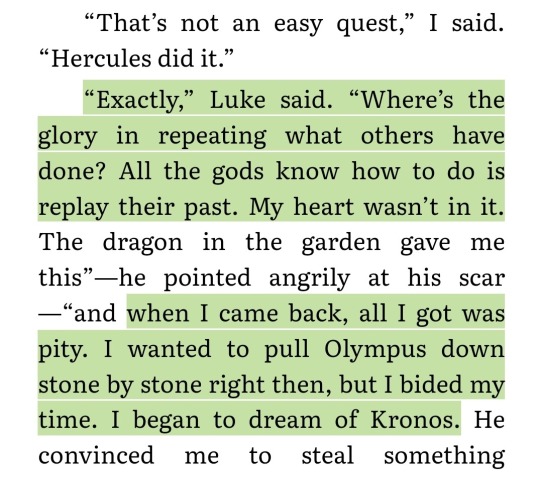
He wanted to pull Olympus down stone by stone because He failed his quest that he didn't want to do because it was already done by Hercules once. 🥴
His endgame has nothing to do with wanting to help ANYBODY. He wanted to take down gods because he had a grudge against them and wanted to Prove that he could do it. Everything else comes secondary if it fits his agenda.
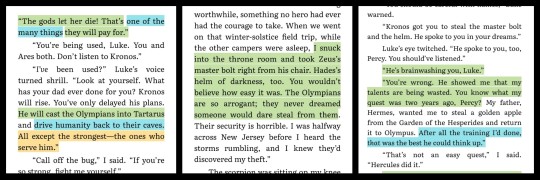
This is one of the reasons why it bothers me so much when people say that Luke had the right idea or that Percy would have joined Kronos if Sally had died like you fundamentally misunderstood the character of Percy if you think he would have joined Kronos.
He talks about "driving humanity back into caves, all except the strongest - who would serve him" THIS IS LITERALLY FASCISM???
(According to Merriam-Webster, Fascism is a political philosophy, movement, or regime that exalts nation and often race above the individual and that stands for a centralized autocratic government headed by a dictatorial leader, severe economic and social regimentation, and forcible suppression)
Now onto the topic of Thalia, Annabeth and Luke
First of all, I absolutely hate that 'Thalia and Luke had a thing before she got turned into a tree bit' because Thalia was 12 and Luke was 14 when they met and Thalia was 15 and Luke was 20-21ish when they meet again in TTC ugh hate that.
Now TTC, where to begin, here I used to believe Luke had already bathed in river Styx as there are some narrations where Percy notes that Luke looked worse and like his scar was reopened and would certainly explain how he survived the cliff fall but on my rereading I realised that Thalia and Luke fought when Percy was holding the sky and Thalia injured Luke so nvm then.
It is however in this book that Luke began to realise Kronos's plan for him as it is implied by the General and he starts to fear for his life.
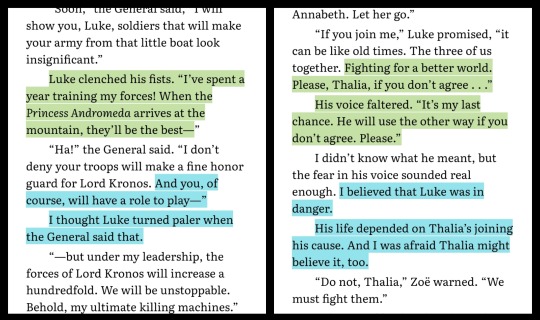
Mind you, what did Luke think would happen if Thalia did agree to join Kronos when he knew Kronos was looking for a host of body...
Luke is many things, he is cunning, manipulative, a great swordsman but what he is not is stupid. If Thalia would have agreed then Kronos would have used Thalia as a vessel 😬
And oh boy the can of worms that is Luke and Annabeth. I've seen many Luke fans/apologists deny that there is no canon evidence of Luke being romantically interested in Annabeth BUT THERE IS?? they refuse to believe and call Annabeth an unreliable narrator because otherwise their uwu white boy would be a Pedophile. Even if he wasn't a Pedo, he manipulated Annabeth so many times to make her sympathise with her and use her emotions against her.
(excerpts from various books: TLO, TLO, BoTL, MoA annabeth's pov)
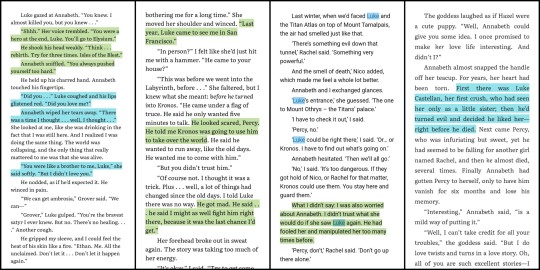
^ Annabeth was 15 almost 16 or already 16 I believe when Luke asked her to run away with him in a romantic sense and he was 21-22.
also another evidence adding to the theory of his fatal flaw having proving himself.
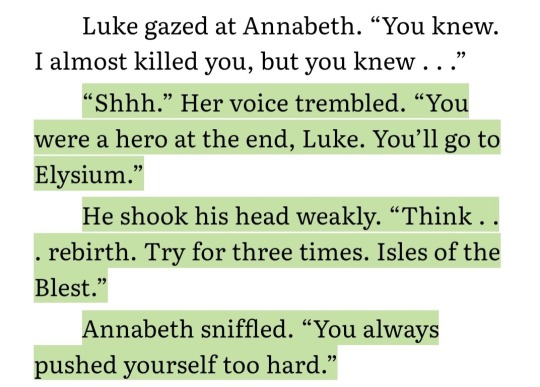
Now, onto the topic of CHB and Luke:
Luke being hesitant to attack camp half blood in BotL has less to do with him suddenly growing a spine (as some fans suggest) and more to do with the inevitable possession.
When Kronos informs that he will himself lead the attack, Luke advises to use Hyperion instead because he knows for Kronos to attack it in person, he would finally possess Luke.
(first one is from TTC, the other two from BoTL)
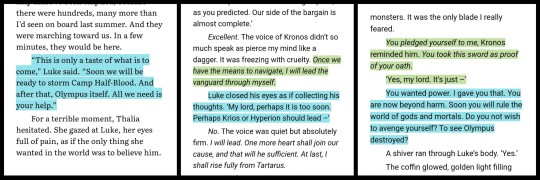
One of the last things I wanna talk about is Silena Beauregard & Luke and Luke's portrayal in the new Percy Jackson series:
Luke was 17 when Kronos started speaking to him and 19 when he left the camp. Silena was 17-18 when she died which makes her 13-14 when Luke left the camp in TLT and 11-12 when Kronos first started talking to him. Adult Luke charmed an underage girl, and promised her that she was helping the demigods and then when she tried to stop, he started blackmailing her. [excerpts from TLO]
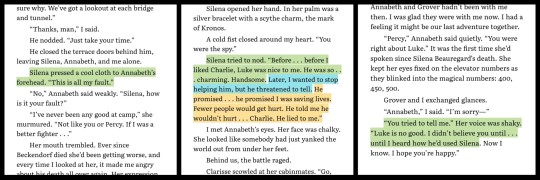
According to the National Society for the Prevention of Cruelty to Children UK, Grooming is when someone builds a relationship, trust and emotional connection with a child or young person so they can manipulate, exploit and abuse them. The relationship a groomer builds can take different forms. This could be: a romantic relationship, as a mentor, an authority figure, a dominant and persistent figure. They might use blackmail to make a child feel guilt and shame or introduce the idea of 'secrets' to control, frighten and intimidate.
So canonically, Book!Luke is a fascist groomer pedophile.
Now on the new Disney+ Percy Jackson show, it seems that Rick Riordan is subtly rewriting the character of Luke and removing the more problematic aspect of him (pedophile and grooming). Let me explain why I think that:
Even though in TLT the book, Luke describes Annabeth as his little sister we know how well that lasted but I don't think they are keeping Annabeth's crush on him on the show from what I've seen (though I could be wrong).
Secondly, the casting of Dior Goodjohn as Clarisse puts Clarisse on the same age range as Luke, maybe a year or two younger but in the first book Clarisse was 13-14 and she was 17 in TLO, so they have aged her up. It is my assumption that they will also age Silena by casting a 17-19 yr old actress as her.
And they have made Luke far more sympathetic in the show than the books (him not calling a hellhound during capture the flag and no pit scorpions in the finale), but we wouldn't know how sympathetic or villainous they are making him until season 2 comes out. Charlie Bushnell gives an excellent performance imo
Though this again reflects the double standards it comes to PJO, they have given much grace and praise for the changes made to Luke's character and little to no complaint for ageing up Clarisse but the hate Walker and especially Leah are given is so cruel. Leah has been so much racially targeted though I think she's an excellent Annabeth, just something to think about.
Also, before I forget-
We don't give enough flack to Rick Riordan for writing two weird age dynamics without recognising as grooming and pedophilic nature. (Lukabeth and Caleo/Capercy)
The characters are never made to realise (especially Annabeth) that an older person having feelings for them as a minor is not a normal behaviour.
Especially in regards to Calypso who may take the form of a 15 year old but is actually more than 4612 (according to the riordan wiki) and her having a crush on 14 year old Percy and 15-16 yr old Leo Valdez, not to mention how rudely she treated Leo. Also her cursing Annabeth because Percy left her. Not only is it plain nasty but she's never called out. Its actually so disgusting🤕.
Anyways this turned into a long rant but I would love to read your opinions, especially on Luke's fatal flaw.
I know for some people it may seem like I'm too hard on him but this is just my opinion.
IMO I have no problem if you like a morally bad or gray person, an antihero or a villain as long as their bad deeds aren't swept under the rug and pretend they never happened or glorify their good deeds.
I actually think villian's bad things make them more interesting.
Luke is an antagonist and a villain of the PJO series and a part of being a villain is that some people are going to hate you and that's ok.
Me personally, I was never a fan of his and that's ok.
I know some people are going to bring up the fact that Percy in MoA sympathises but the PJO characters are complicated and Luke was very skilled at making others think of his reason to destroy the Gods the way they would sympathise the most and we see that multiple times.
#percy jackson meta#percy jackson and the olympians#luke castellan#anti luke castellan#i think#annabeth chase#thalia grace#silena beauregard#clarisse la rue#titans curse#battle of the labyrinth#the last olympian#mark of athena#pjo tv show#percy jackson#percy jackson and the olympians tv show#anti calypso#anti caleo#leo valdez#perseas-wellyboots#rick riordan critical
267 notes
·
View notes
Note
just saw ur gale/mystra analysis post. im new to the game and dnd lore and honestly… ur take on their relationship feels like the most natural/compelling one??? esp since its all too easy to simplify topics that have many facets and nuance….
thanks for sharing i love analysis and reading people’s takes on narratives : D
My pleasure! (Bee from the future here: congrats, you spawned another meta!)
I love complicated characters, WAY more than I like a clear cut-and-dry case. Flaws, to me, are what make a character compelling and lead to interesting stories about them with choices that can get them into situations. I'm both writing a fanfic and running a campaign where I'm playing as Gale, and in the interest of portraying him properly and in-character, I've gone into SUCH a deep dive into all the decisions and facts that make him him.
It helps to, y'know, also be in love with the fictional wizard, but I digress
The thing about Baldur's Gate 3 is that no character in there is perfect. I've seen a couple analyses about the theme of continuing cycles of abuse vs breaking out of them, but in my mind, in terms of the characters themselves, it goes like this:
The origin characters have just come out of the lowest situation of their lives (Lae'zel being the exception; being tadpoled is a gith's worst nightmare. You're seeing that lowest situation in real time).
Not the lowest point, mind. Gale's lowest was probably the day after he got the Orb. Wyll's was probably the day his father cast him out. Karlach's was the day she lost her heart. But the lowest, accepted normal for them is what they've just left.
They're then thrown out of their depth and forced to rely on you to live. That's #1 priority: living. We get the extremes of these characters before we get their nuances, because they're quite literally at their breaking points.
Then once we get to know them, we see their wants, their hopes, their fears, as they open up to us. Every companion's story is at their own pace, but they all have a moment where they ping-pong between despondency and desire. Sometimes that desire is what we know isn't good for them, like Shadowheart wanting to be a Dark Justiciar. Sometimes that despondency is only for a flicker, like Astarion's realization that he's condemned 7000 people to a half-life of tortured spawnhood for as long as he's been a vampire.
Romance lets us crack all that open more, because if you pursue a romantic partner, they see you as their closest confidant. They WANT to trust you, so they're more willing to explain how they see the world and what decisions they want to chase.
And then their endings. Those often get simplified as good/bad, continuing the cycle vs breaking away from it. But how is Duke Wyll on the same platform as Ascended Astarion? He's not evil, he's not even entirely unhappy. He might even have broken out of his abusive cycle with Mizora, if you played your cards right. And Ascended Astarion is overjoyed, even if he is remarkably more cold.
I think that the endings are less a dichotomy of "this is good for them" vs "this is bad for them," and more one of "bringing out their best traits" vs "bringing out their worst."
Wyll's worst trait is being willing to sacrifice his own wants for whatever people desire of him. His best is standing for what he believes in and ensuring people are safe. Duke Wyll leans into that necessity to turn the other cheek in the name of people who count on him, while the Blade of Avernus has seized that moral compass of his and forged it out of mithral.
Shadowheart's worst trait is blind obedience at the cost of her individuality, while her best is her desire to be kind to things that don't deserve to be hurt. Mother Superior Shadowheart's whole life is defined by Shar. Selûnite Shadowheart's life is defined by her hospitality, especially towards animals.
Karlach's worst trait is how willing she is to accept that things are (to quote her) fucked, letting despair override hope. Her best is her durability in the face of horror. Exploded Karlach would rather die than try to work out a solution in the Hells, because she's terrified of facing Zariel alone. Mindflayer Karlach has accepted her fate and decides to give up her heart and soul to go out a hero, losing who she is. Fury of Avernus Karlach is willing to keep fighting for a solution, and by the time the epilogue happens, she's got her sights set on one.
Astarion's worst trait is his desire for power over people. His best trait is using the tools he has to his advantage. Ascended Astarion has let his powerhungry nature and paranoia lead all of his decisions, with his sights set on dominating mankind. Spawn Astarion has embraced what he is, and carved out a life for himself where he can do as he pleases.
Lae'zel's worst trait is her blind fanaticism, while her best trait is her individual dedication, making her loyalty a marriage of the two. Ascended Lae'zel is a meal for the lich queen, turning a blind eye to all Vlaakith's tried to do to her and literally being consumed by her fervor. Champion of Orpheus Lae'zel has turned her loyalty into something productive for diplomacy. Faerûnian Lae'zel has seized her individuality by the throat and decided her own future.
And then Gale. Gale's worst traits are his hubris and, paradoxically, his low self worth. His best traits are his creativity and wonder for the world. God Gale is the embodiment of ambition, having burned away all but that in pursuit of perfection. Exploded Gale has let his remorse blot out all hope for a redemption in which he does not die, because he thinks he's earned it. Professor Gale leads his life by embracing the school of Illusion and letting his creativity thrive, teaching others to do the same. House Husband Gale has multiple creative projects he's working on, and Adventurer Gale is always finding new sights to see and wanting to share them with you.
There are arguments to be made on which ending the origins are happiest in, certainly, or which one benefits them the most, but each ending represents the extreme of a facet they possess.
So with all that, there's a sort of malleable method to figuring out the ins and outs of a character.
You take their endings—all of them, all variables they can have—and reverse-engineer the flaws and details they carry. Then you start to notice how those work into their approvals for minor things: Astarion approving of your taking of the Blood of Lathander, or Shadowheart approving of standing up for Arabella. Getting a list of approvals and disapprovals is helpful, but having those endings on hand tells you why they react like that to a majority of their decisions.
You take their romance-route explanations of how they act, and apply those to earlier decisions. Astarion's confession to manipulating you and Araj-prompted admittance to using himself as a tool brings to light how he reacts to your decisions, regardless of his actual opinions on them. Wyll's fairytale romance and love of poetic adages speaks to his idealistic nature, and why he takes a sometimes-blinded approach to decisions in which the "right" answer isn't always the smart one.
You take their beginning reactions to stress and use that to measure how future decisions impact them. Lae'zel locks down and gets snappy when she's scared, while Gale immediately turns to diplomacy. Shadowheart has gallows humor, while Wyll turns to quiet acceptance. If they break from these and seem even worse, you know the situation is more dire in their minds than having seven days to live.
And then you factor in all their fun facts and dialogue choices and backstories.
A wizard falls in love with a goddess and her magic, attempts to retrieve a piece of her power for her, is scorned for his attempt and is cursed to die.
Give that backstory to a Tav. Look at how it changes.
A chaotic good wizard fell in love with a goddess, thought retrieving a piece of power for her would be a showy bouquet of love, and was punished for not thinking things through.
A lawful evil wizard fell in love with a goddess's power, snatched the most precious thing she owned, tried to use it to barter his way through to the secrets she kept, and was given a swift retribution.
Same backstory. Same class, same act, same goddess. Wildly different connotations. Wildly different conclusions as to who is in the wrong.
If you take all there is to Gale, all that the game shows us makes up his character, and apply it to this backstory, you get what really happened:
A wizard, enamored with magic, fell in love with a goddess. His desires led him to want more than she was willing to give. In his well-buried fear of inadequacy, he concluded that the reason she wouldn't indulge his ambitions was because he just hadn't proven himself worthy enough. So he tried to prove himself, but he lacked the context for what he was proving himself with. And the goddess, seeing a weapon that had killed her predecessor, saw this ambitious wizard as losing his way and coming for her just like the weapon's creator had. She was angry, she withdrew his link to her, and he didn't know why. So he drew the conclusion that she took his powers to punish him, and let that encompass his fall from grace.
Was he wrong to reach for what was out there?
If you knew that the answers to everything you cared about were not only known, but kept by someone you loved—someone who adored you—what would you do to ask to see them? What if your curiosities were if there were other planets with life out there, or how dark matter worked, or whether or not we could one day travel in the stars? What if it was the potential cure to an illness that's little-understood, or the way to make a program you dreamt up, or the scope of the true limits of your artistic talents? Would your answer change?
Was she wrong to cut him off?
If you were once hurt, and the person you loved—the person who adored you—brought the thing that caused it to your door, believing you'd want it, how would you react to seeing it? What if that thing was someone you thought you'd broken contact with, like a friend or family member you'd been trying to avoid? Would your answer change?
That's the sort of scope that needs to be applied to this, on both sides. You have to take the perspectives of each party, and apply two analogies instead of one.
Gale saw the vastness of the universe, untold wonders, the solution to every question he could ever dream up, and saw Mystra as withholding this from him because she thought he just wasn't worthy enough. To claim Mystra knew his perspective does her a disservice.
Mystra saw a cruel weapon she thought long gone, in the hands of someone who could use it, brought right to her, and thought Gale was willingly following the path of Karsus. To claim Gale knew her perspective does him a disservice.
Should Gale have researched his prize more, so he knew just what he was obtaining? Should he have kept his hands off a cursed book that would devour him? Of course he should have.
Should he have given up on chasing his dreams?
Should Mystra have understood that Gale's pursuit of power was nothing like Karsus'? Should she have communicated when she was angry instead of giving the cold shoulder? Of course she should have.
Should she have given him the benefit of the doubt?
That's the root of their falling out. That's what leads to hurt being inflicted. Understandable, human reactions to the situations they perceive. Unhealthy, unwise choices made afterwards.
You work backwards from this to figure out their dynamic as Chosen and goddess. You work forward from this to understand more of where Gale and Mystra are during the events of Baldur's Gate 3. Gale reached too high, and understands this. His goddess hates him, and he regrets this. Mystra isolated Gale, and understands this. Her Chosen wants redemption, and she wants to make it happen.
Just like we took Gale's character into account, we also have to take Mystra's.
A goddess is faced with a problem. She uses someone who's desperate for approval to solve it, by telling him to kill himself.
An evil goddess is faced with a threat to her reign. She sees someone who's unfailingly loyal and hates himself, and elects to have him tear himself apart rather than do anything about it.
A good goddess is terrified of the future. She sees someone who tried to hurt her, who's going to die anyways, and tells him to use it to save the world.
Same story. Same act, same power, same pawn. Different character. Different perspective. Different outlook on whether or not this is the right thing to do.
Mystra has died, multiple times, to people trying to stake claim to her domain. Someone appears with the very thing that could do it again, right as she's regained her stability.
She does not see mortals the way mortals do. She is timeless. She is eternal. She has a duty to protect billions of people, and one person lost to protect that number is more than worth the sacrifice.
People like to bring up the Seven Sisters as proof of Mystra's cruelty. For those unaware, Mystra asked permission to, then possessed, a woman, used her to court a man (with dubious consent from the woman), and bore seven children, all of whom were capable of bearing Mystra's power as Chosen without dying. The woman she possessed was killed in the process (reduced to no more than a husk, then slain by her now-husband, hoping to end her suffering), and the husband was horrified by the whole story.
Mystra needed Chosen in order to restore herself in the event that she was killed again, to prevent magic as a whole from collapsing and wreaking havoc on the mortal realm, like it had in the few seconds Mystryl had been dead. Elminster, Khelben Blackstaff, and the Seven Sisters contributed to this. The more Chosen she has, the better; what happens if Elminster dies? She can't afford to have all her eggs in one basket.
Mystra has Volo (yeah, that Volo) as a Weave Anchor, imparted with a portion of her power to prevent the Weave from shredding itself to pieces in her absence. All Chosen of Mystra are Weave Anchors by nature. The creation of Weave Anchors was mandated by Ao, the Overgod, and Chosen are the best way to make sure those anchors aren't drained by ambitious people hoping for godlike power. Chosen can, and will, defend themselves, unlike static locations (which Mystra also has). The anchors are why the Weave wasn't completely obliterated during Mystra's last death, when the Spellplague rose up, because they stabilized the Weave around them.
Everything Mystra does is in the name of the big picture, to prevent a catastrophe like the fall of Netheril from happening again. Her restriction of magic, her numerous Chosen, her creation of Weave Anchors, her destruction of those who would claim her power, it's all in the name of the stability she's been charged with. Dornal Silverhand's grief and Elué Silverhand's death, while regrettable, were worth it to bring seven more anchors into existence to save all of the Material.
So someone appears with the Crown of Karsus, potentially powerful enough to try to kill the other gods in the name of the Dead Three. She can't risk being a target of them. She can't risk the destruction of magic again.
Gale is going to die. He lives in fear. He begs for forgiveness.
In Mystra's eyes, she's offering him the best outcome. She'll let him die in service to her, to save Faerûn, and she'll forgive him. He's going to die anyways, and if he does this, she'll give him everything (she thinks) he could ever want in her realm. She's asking him to do what (she thinks) is the right thing.
"She would consider what she considers to be forgiveness."
Notably, she leaves the decision in his hands. She doesn't have Elminster lead him to the Nether Brain. She doesn't activate him as soon as he's there. When he lives yet, she doesn't revoke the charm that keeps him stable. And when he declines, when he lets it go and starts pursuing Karsus' path, she doesn't smite him on the spot.
She is (she thinks) being incredibly patient. If Gale is going to try to be Karsus II, she's ready for him. If he decides to walk off and keep the Orb, he's dug his own grave in the Fugue Plane (those who don't have a god to claim them roam endlessly as husks and form a wall of bodies around the City of Judgement).
From her perspective, she's not being unreasonable. But from the perspective of a mortal, she absolutely is.
"Now, I have a question for thee: what is the worth of a single mortal's life?"
This is a question she cannot answer properly.
I think a lot of characterization is lost whenever someone paints one of them as being totally in the right. But I also think you have to be invested in them as characters to want to see that characterization. If you want to write about Mystra, you have to try to get into her head, analyze the decisions she made, figure out why she thinks she was right, and follow the pattern.
Gale's sacrifice is a very predictable thing for her to ask for.
#bg3#gale dekarios#gale of waterdeep#mystra#long post#like really long post holy hells#did not expect this to go on for this long#swearing tw#< for karlach#oh yeah#astarion#karlach#wyll ravengard#shadowheart#lae'zel#ask bee
307 notes
·
View notes
Text
Here's a link to a blog post on my personal website on a topic that I think is very important.
I've also put it below the read more for people that don't like external links.
When it comes to healing from trauma, there are a lot of emotions an individual may feel. One of these emotions is anger. Anger is one of the emotions I see invalidated the most. For example, I’ve been told that being angry is “letting the person who hurt me win.” I’ve been told that I’m only hurting myself with my anger and that it’s holding me back from healing. All of these assumptions were wrong.
Anger is often viewed as a bad thing because it can drive a lot of unpleasant behaviours but it can be used for good. While anger can hurt you and others, it doesn’t have to. There is a difference between destructive anger and constructive anger. Destructive anger is often expressed in a way that causes harm to yourself or others whereas constructive anger can be used to better understand your situation and figure out your needs. Constructive anger can be a way to show respect for yourself.
For example, if you’re in a situation with a friend where they do something that makes you angry (for example: cancelling plans, forgetting an important date, etc), constructive anger may involve you stepping away from the situation to figure out the cause of your anger (for example: you feel their actions imply you’re not important to them) so that you can then sit down with your friend and communicate in a calm manner. This may allow your relationship to grow and build with a better understanding of each other. Destructive anger in this situation may involve you yelling at your friend and insulting them, which will likely damage or destroy the relationship. If the hurt your friend has caused makes you want to re-evaluate your friendship, this is valid and there are still constructive ways to end a friendship that will cause the least amount of hurt for all involved. It is also important to note that ignoring the anger and bottling up is likely to cause a bigger blow up down the line or cause “overreactions” to other circumstances.
If anger is bottled up, it can end up coming out unintentionally. You might find you’re getting much angrier at everyday annoyances and disagreements than you might think reasonable. People might push you away or respond badly to your anger, because they feel they do not deserve it - and looking back later, you might feel they don’t deserve it, either. However, because of the anger you’re holding back, you can’t see that in the moment. This is why it is important to think and consider your anger, and listen to what it’s trying to tell you. I have found asking questions of myself to analyze my anger can help, such as in an anger inventory like this one.
While many people see anger as an emotion that causes people to lash out and destroy things, anger can also help to motivate people to create new things. Marches to “Take back the night”, or for “gay pride” have much of their motivation based in anger at injustice and oppression. New laws to better protect survivors of domestic abuse or otherwise help society are often driven by people feeling a huge amount of anger. Properly harnessed, anger can help to take action to change things for the better.
On a more personal level, anger can also be a motivator to improve one’s own life. Many people have used the anger they felt at those who put them down as a motivation toward success. That success might be completing schooling, winning an international athletic competition or publishing a novel. One thing all of those have in common is that they are rarely possible to do with only a little time or a little effort. They are time-consuming tasks which usually require months if not years of work. They can be easy to give up on without motivation - and for many, anger is a big help to keeping that motivation.
It took me years to feel anger. For the first while, I felt ashamed, guilty and like I deserved the abuse I’d endured. Feeling angry at the people responsible for this was a step in my healing. I began putting the blame on those responsible and not myself. I was realizing that I did not deserve to be treated in the harmful ways that I was. This was huge to me as someone that had spent years thinking I deserved my trauma and as a result, future trauma and abuse as well.
There were instances where my anger was destructive, mostly to myself. I engaged in self-harm as a way to vent my anger and it also caused problems in my relationship at the time because I held my anger in and would get really frustrated and project my anger onto my relationship which was not fair to my partner.
Over the years, I’ve learned to cope with my anger more efficiently. What works for someone is largely dependent on them and their needs. For me, it was a literal punching bag to vent out frustrations and journaling. It was sitting down with my anger and treating it like a friend trying to protect me (because it was in a way). It was listening to it and finding the cause. My true anger came from those who hurt me, and in a way, took a part of me. My anger largely came from grief and betrayal. Understanding where it came from did not make it disappear, but it did offer me perspective and allow me to better manage it.
For some, anger is a cover up for other emotions. It becomes a defense mechanism against feeling the sadness, hurt and other emotions that a person does not want to feel. The anger is just the first layer and understanding where that anger comes from, and that the anger is a cover up is a great step in moving beyond it. Feeling the emotions beneath it will play a big part in moving beyond the anger.
Anger is a valid and understandable emotion when it comes to healing from trauma, even if your trauma does not have a specific person to blame (natural disasters and death of a loved one are examples). If the person who hurt you did not mean to or did not know better (like another child), anger is still a valid emotion. You’ve been hurt and you should not have been and it is reasonable to feel angry at this.
For a lot of us, anger plays a part in our healing. And that’s okay! You’re allowed to feel angry. Anger becomes an issue when you allow it to consume you and hurt you or others. The feeling itself is not inherently bad, and it can actually be a good thing. Your anger can be used to help you. It’s what you do with your anger that decides whether it’s helpful to you or not. When I was first told that my anger was “letting the other person win,” I believed that and felt invalidated. I have since realized that my anger has been an important part in understanding my pain and my needs. My anger is not letting someone else win, but letting me win, by helping me to heal.
#my blog posts#i am going to be gradually re-posting my posts#with text under a read more#to make them more accessible to people that don't like external links#anger
476 notes
·
View notes
Text
hi this is a very controversial topic in the house md fandom i feel like and i'm going to speak on it. feel free to agree or disagree in the comments and reblogs, but truthfully i don't think anything you can say can or will change my view point.
that being said - house was never the "bad guy". is he a great guy? absolutely not. he's deeply flawed and i can understand why a lot of people hate him. it's hard to like somebody when all you're seeing is what's on the surface. he's cold, abrasive, mean, and an entire list of other words i could use to describe house but that's not the point of this post.
i can guarantee that there is not a single person on this planet that could go through even a quarter of the shit that house has gone through and still say that they're not miserable. you cannot expect someone to go through hell and not come out of it a changed person, and you cannot get upset with a person who's gone through hell and is bitter because of it.
let's start with his childhood. it's always been kinda up in the air just how abusive house's father was - the only real instances we were ever given detailing the abuse was ice baths, being made to sleep in the yard, and being given the silent treatment, which are all absolutely horrible things to do to child, however his childhood wasn't something that was ever touched on a whole lot. house even admits that there were good times, and a lot of people overlook that fact. a lot of y'all aren't willing to accept that people can have good memories of their abusers - that's how they become abusers in the first place. especially in terms of abusive relationships - there had to be good memories before the bad ones could be made. we don't know how john house was in terms of how he spoke about his son to other people. he could have described his son as his pride and joy to the general public but behind closed doors shamed house for not being more like him. having a tainted relationship with a parental figure is damaging and it's really no wonder why house grew up with such a skewed perspective on the concept of unconditional love.
chronic pain is a whole other issue. he was forced into a medical procedure against his will and regardless of whether or not it saved his life, it was still a direct violation of his bodily autonomy and to make it worse, the person that did it to him ending up abandoning him when he became too much of a burden. chronic pain is already hard enough to deal with. i deal with it myself and i completely understand why house gets the way he gets when he's in pain. to the rest of the world, they watch him function and think that the pain can't be that bad, and it's the same shit i experience in my own daily life. the pain is incredibly overstimulating at times and despite how good we might be at pretending that it's not, we're suffering inside.
another thing that doesn't help is how many people remind house on a daily basis how horrible he is and how they're worse off for knowing him. do you honestly expect him to start acting like everything is all sunshine and rainbows when people are practically telling him he's better off dead? that the world would be a better place if he wasn't in it? he is the way he is because everything in his life has proven to him that for some god forsaken reason, the universe is working against him and the only way for it to not hurt him is for him to become an isolated, antisocial individual. can't get hurt if you don't let anyone in, right?
while i'm here, i'm also going to touch on instances in the show that he gets blamed for. amber's death and chase getting stabbed were not his fault. everyone wants to sit here and blame him but there's no blame to put on him. with amber, he specifically called looking for wilson. he told amber to find wilson and send him. amber came anyway. it wasn't her fault either. it was no one's fault but the guy that drove into the bus. house risked his life to try and save amber's, and yeah she died but it wasn't his fault.
and with chase getting stabbed, that wasn't house's fault either. house might have taken the blame for it because if the blame has to be pinned on someone, might as well be him, right? but you can't blame him for either situation.
idk maybe im yapping too much and maybe none of this makes sense but it makes sense to me
47 notes
·
View notes
Text
the "but almost all games nowadays are exploiting children (and all ages) players?" type comments about the sso thing are just haunting me. the "but thats weird, why this?" reaction, instead of "hell yeah! we need to destroy exploitative manipulative advertising and companies that do this to people!"
ppl are so used to being bombarded with exploitative advertising and dishonest marketing and being manipulated and brainwashed and exposed to schemes to try to get you to waste money on useless gambling and subpar quality products. and ppl are so used to *children* being bombarded with that. that it feels okay to them. that it feels like "well, thats just how things are".
and i keep thinking about how extremely insane it is to me that ppl will be actively mad about fandom shit but NOT ACTIVELY MAD about advertising and exploitative tactics.
like. if you are mad about ppl saying "i hate this game", or by people drawing fanart you dont like, or whatever, if that somehow affects you personally emotionally (it really doesnt have to you know - its not a good place to be in) but youre. not everyday being personally emotionally affected by the fact that capitalists do this shit to everyone and to children who cant even fucking tell that theyre being advertised to. the children dont fucking understand that the companies are preying on them. they cant recognise advertising for what it is. they dont know quality standards. they dont understand what gambling is or why its bad. they dont know how to tell when companies are lying. they dont know how bad plastic is. they dont know how much all of this explotative capitalist shit can hurt them and everyone else and our planet.
it just drives me crazy. that ppl can be so upset about random things individuals online are doing who are not capitalist and not abusers and not exploiting children or vulnerable people, but youre not actively fucking screaming against capitalism, against how people are being killed in the name of Owning More and Making Money (the wars killing people are about money and resources and land!!! capitalism!!!), about the planet being destroyed, about human rights being violated, all these things, are less important to you (you dont get that upset about it everyday, you dont scream about it everyday) than some fucking random harmless people saying your favourite game or movie sucks, bc now thats a real issue, or someone writing a fanfic you think sucks, bc now thats a real issue, or someone telling you to stop being mean to harmless people is sooo awful what a crime cant believe your human right to free speech is being suppressed like that, while people are fucking dying to make your sweatshop fashion and your slavery chocolate.
boohoo i have real issues too, yeah heres the thing, im sure you do have a few real issues. like being ND is a real issue, or being queer, or being oppressed for how you were born, or how you look, all of those things are real issues. but if you get mad about fucking dumb ass fandom things like ppl criticising a game or disagreeing with you about a fandom topic (not a human rights one) or god forbid people telling you to be kinder and more respectful to others. if those are things you get mad at. and you go "huh but exploitative advertising and monetising towards kids is normal?" or "but theyre a company they have to do pay staff?" i just want to fucking scream
#im going insane about how nobody has a fucking sense of priorities i dont know how to fucking cope interacting with people#who are this fucking logically lost. im getting so tired of it. its exhausting. i feel sad for everyone who is brainwashed but#i also feel just exhausted. take accountability and responsibility and learn to prioritise and understand scope and scale#and stop fucking being mad at oppressed people doing random ultimately harmless shit when you cant even speak up against capitalism-#- against the entire fucking planet and humanity and animals being destroyed. i cant deal with you
7 notes
·
View notes
Text
Another Maruki analysis: His literal Mask
I kinda wanted to do an analysis on his literal mask since this was a realization that hit me really. Now I agree that it looks absolutely silly and I wonder what Atlus was thinking with his overall outfit but... I can't help but think of something here...
Now "Masks," both literally and figuratively, play a primary role in P5 in regards to its characters. They hide who they really are because of either pressure to meet societal expectations, fear (Ex: rejection), dealing with various forms of abuse, and of course trauma. Especially as way of coping with said trauma. It is also a thing in Psychology known as, "masking" which is basically the description I just gave. Masking is basically, as an example, someone performing in a way that it is considered, "acceptable." But it can be at the expense of expressing who they really are, hiding their true selves. It's never fun at all as someone who deals with this on occasion and can even hurt the individual deep down. It can even worsen their mental state as well.

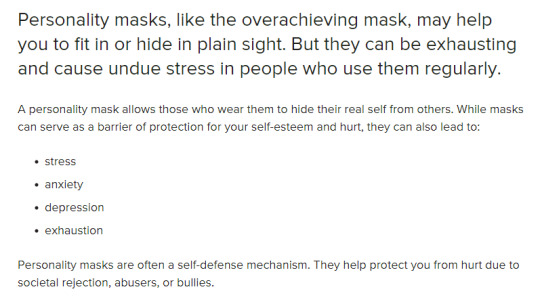


I always feel bad for those that had to go through it for one reason or another. But back on topic. When the MCs awaken their Personas, they literally tear their own masks off (with an exception or two). It's framed as painful but then liberating. They feel free and are done with all the bs they had to deal with. Each mask also has a unique design for every Thief and it's all unique to them and even symbolic of either their true selves or even just overall personality.
So, what about Maruki? While it does look ridiculous... As I've mentioned in a previous post, it almost resembles a shield. A large one at that. Now you could argue Makoto's does as well but it's short and is more like a knight. It also reflects her more tough personality. In Maruki's case though... It covers his whole head and top part of his face (minus his eyes 'cause he needs to see somehow). I also mentioned that it's ironic that "Throw Away Your Mask" is basically his thought process and mental state and yet he is hiding behind his own mask.

Now the "shield" thing can be a double meaning: He doesn't want to hurt the Thieves at all and can be considered a pacifist unless pushed and even while fighting he tries to reason with them and mostly uses Azathoth/Adam. But at the same time, it can also be his own mental defenses coming to the surface. He's hiding behind a metaphorical shield and running away from everything. The truth, his true feelings, his trauma, everything. He gives a calm and serene/gentle demeanor ("Gentle Madman") which is genuine but also puts up his defenses. Even when everything around him is falling apart, he refuses to believe that "his way" was ultimately wrong and harmful even when he knows or realizes it.
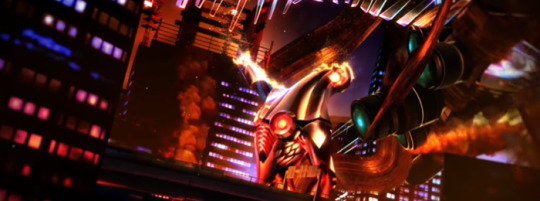
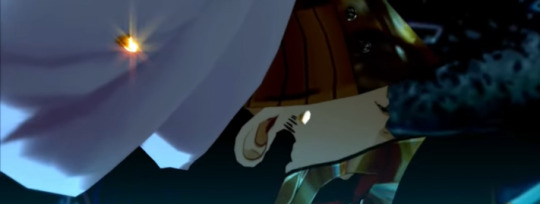
Then it gets damaged, and Adam is destroyed which is when he starts to fully break. His barrier is falling apart. He starts to show more of how he really feels. He has awareness and is regaining it at the same time and the cracks remain.

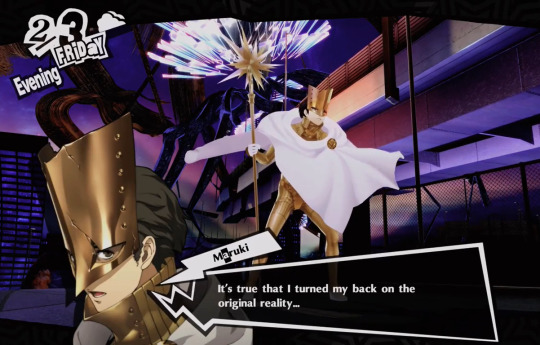
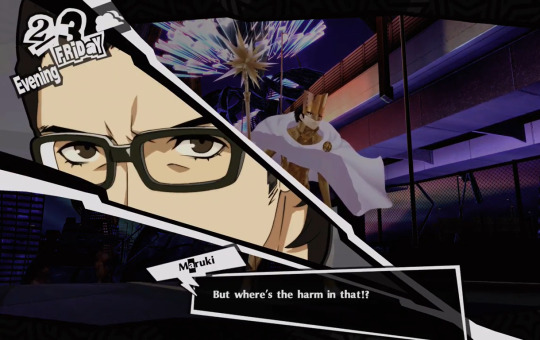
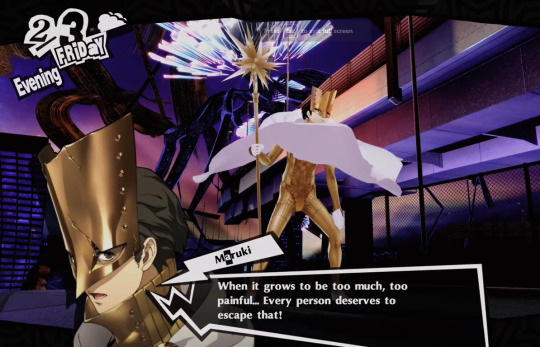
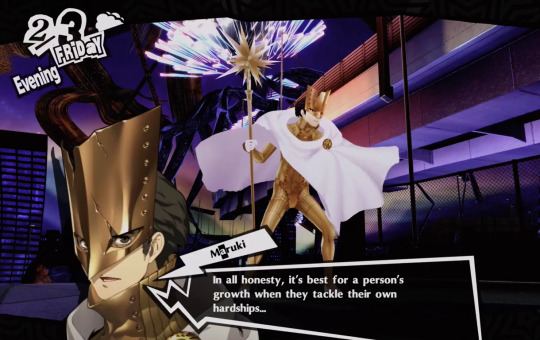
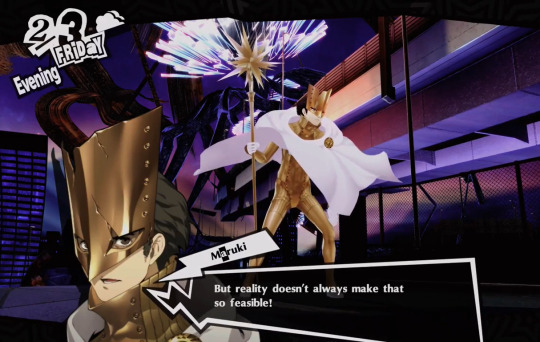
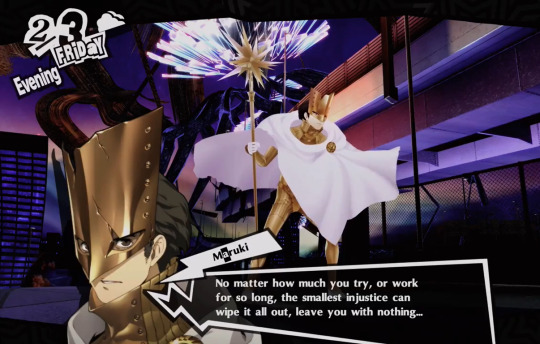
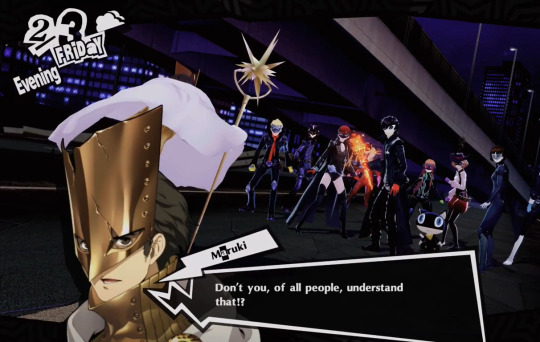
Then he fully removes it and later his godhood outfit changes to his white attire albeit torn up, damaged, and dirty. He's completely vulnerable. No barriers... No mask.
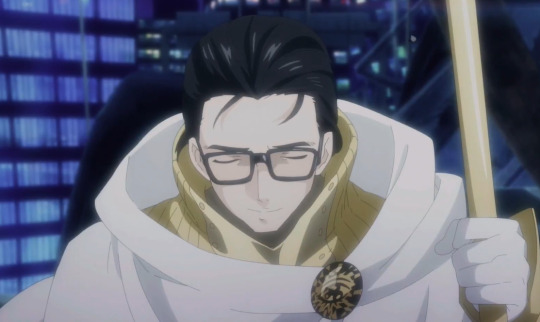
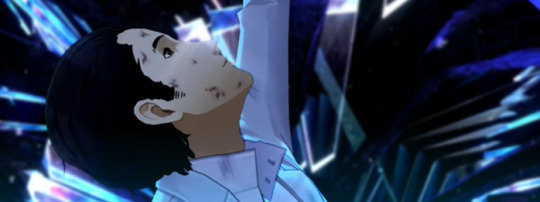
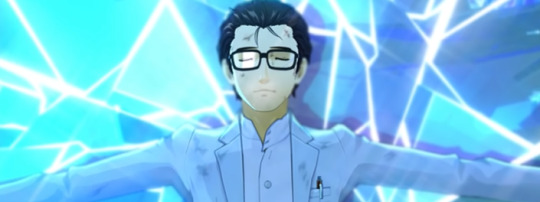
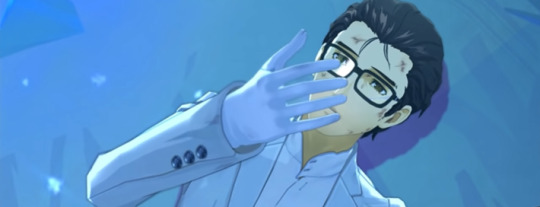
He's not hiding anymore, and we see who he really is: A sad, traumatized, and broken man who gave up everything for a dream that was ultimately not gonna help anyone... Not even himself. He wanted to do good so badly but went too far and about nearly lost himself in the process. It was unhealthy and self-destructive... Like the story of Icarus, hubris got the better of him and flew too close to the sun. All because of things that were out of his control and led to him making impulsive and downright harmful decisions. It's being human and understandable. But he still needed to be stopped, otherwise... Things will turn out for the worse for everyone, including him. Now I wonder what other character this can remind people of...?
So, joking and small fandom jab aside, a TL;DR version: Maruki's mask can represent a barrier he put up for himself to hide and run from it all and once it cracks and it's fully taken off, he shows his true feelings, coming to terms with himself and the truth. It's only then he starts to take steps towards healing and starting over on his own two feet. No hiding, no mask, no barrier. Just him and whatever reality will throw at him, and he'll try his damndest to get better and even redeem himself.
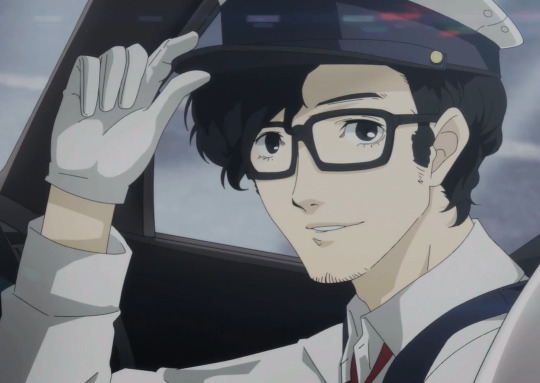
#persona 5#p5#persona 5 royal#p5r#starchild rambles#long post#meta#p5r maruki#p5r spoilers#dr maruki#takuto maruki#persona 5 maruki#crossposted from twitter#character analysis#analysis
87 notes
·
View notes
Text
I sort of feel as if I was misled about the ITV interview a little. Within the context of it, Bradby is clearly grilling Harry on the topic of racism, and how it looks for members of the royal family to have all these allegations of racism tied to them. During this discussion Harry says about unconscious bias and the comments about Archie's skin colour:
But once it’s been acknowledged, or pointed out to you as an individual, or as an institution, that you have unconscious bias, you therefore have an opportunity to learn and grow from that in order so that you are part of the solution rather than part of the problem. Otherwise unconscious bias then moves into the category of racism [ . . . ] the environment within the institution, and why after our Oprah interview, they said that they were gonna bring in a diversity tsar. That hasn’t happened. Everything they said was gonna happen hasn’t happened [ . . .] if you are called out for unconscious bias you need to make that right. And you have the opportunity and the choice to. But if you choose not to, then that rapidly becomes something much more serious.
So, what I'm getting here is that Harry is saying, while the royal family might not have been intentionally racist with their actions, it has now been brought to their attention on various occasions and they have still failed to correct those mistakes and learn from them. Now it becomes a more serious problem of racism because they are aware, but aren't doing anything to fix the problem, incidents like with what happened to Ngozi Fulani. Maybe Lady Susan didn't mean harm (that's why he was saying he and Meghan love her, as a way of saying he doesn't think she acted with malice, not to excuse her actions), but her insensitive comments were a result of the palace making no effort to train people on diversity, resulting in racial minorities getting hurt.
He is still sort of misusing the term unconscious bias, but this is definitely not him saying the royal family isn't racist. My only issue with this is that he's using too many words, I cut a lot of it out and his answer is still too long. He needed to be more direct, which is hard, but it would have given a better answer. He's trying to control the press narrative which will paint him in direct opposition to his family, I get that, but the answer could have been given more coherently.
The "Africa's my thing" comment was taken out of context, I got an anon pointing that out, Bradby was quoting something written about William in Spare. William didn't want Harry doing charity work in Africa because that was "his thing" and that reveals a colonialist mindset on William's part.
Harry said he has no issues with the monarchy as a concept and still believes in it, but that does not signal to me any loyalty to the current British firm. He still obviously has grave issues with them and he has no plans of returning ever, he just believes that these issues aren't inherent to the system and can be fixed. Honestly, that's fine for Harry to believe that. I have never viewed him as an anti-monarchist, the value of his story comes in revealing the toxic workings of the British press and the abusive/hurtful elements of his family, and making a case for why these issues are harmful and need fixing not as a manifesto as to why monarchy is a bad political system. Will his book probably demonstrate why the monarchy is bad inherently? Yes, but that's not in line with Harry's personal views and that's all they are—personal views.
45 notes
·
View notes
Note
what do you think of the new For the Strength of Youth?
From what I've seen it is better than what came before it.
I like the idea that it now presents principles and invites people to live those without giving a list of specifics on how to apply those principles.
————————————————————
Here's a few things that caught my eye:
Treat everyone as a child of God. As a disciple of Jesus Christ, you can lead out in treating people of all races and religions and any other groups with love, respect, and inclusion—especially those who are sometimes victims of hurtful words and actions.
Use social media to uplift. Social media can be a powerful communication tool. If you use it, focus on light, faith, and truth. Don’t compare your life to what other people seem to be experiencing. Remember that your worth comes from being a child of heavenly parents, not from social media.
Sexual feelings are an important part of God’s plan to create happy marriages and eternal families. These feelings are not sinful—they are sacred. Too often LDS youth are taught that these feelings and attractions are wrong, I'm glad they are removing that stigma. I like that they don't use the terms like "petting" but are clear and direct in their language. I especially like they removed all the rules about length of women's skirts or prohibitions on tattoos or getting a 2nd earring, the list of specifics is gone and up to the individual to interpret & apply the principles.
I am attracted to people of my same sex. How do these standards apply to me? Feeling same-sex attraction is not a sin...Remember that the Savior understands everything you experience. I like that they make clear these feelings are not sinful. I also like the implication that Jesus felt these same feelings. While we teach that Christ felt all the things humans experience, many Church members would be offended at the idea that Christ ever experienced what it's like to be gay.
I was abused, and I feel ashamed. Am I guilty of sin? Being a victim of any abuse or assault does not make you guilty of sin. I'm glad it's clear that you're not guilty or accountable for the abuse you experience
What is the Lord’s standard on dress, grooming, tattoos, and piercings? The Lord’s standard is for you to honor the sacredness of your body, even when that means being different from the world. Let this truth and the Spirit be your guide as you make decisions—especially decisions that have lasting effects on your body. The rules about hemlines, showing shoulders, tattoos or ear piercings are gone. GONE! You decide for yourself
Truth will make you free. This section includes that it's okay to have questions and doubts and being educated is important. Our church says all truth is embraced and fits together. The problem has been that truth learned in a laboratory that challenges previous teachings has generally been pushed away. Research shows that being LGBTQ+ has biological components and is not just an “attraction” and I think the implications of this are profound
Find joy in Christ. Choices matter...But that doesn’t mean the path will be problem free. Too often church members speak as though if something went smoothly then it was God's will, it was meant to be. However, one only has to look at LDS Church history to see we don't believe that, the pioneers didn't have it easy.
What about … ? I like there is an appendix where a person can look up a topic and click a link to find what For the Strength of Youth says. It's useful.
————————————————————
Things I wasn't crazy about:
The idea that the commandment to love God is different from the commandment to love others. Matthew 22:39 says "And the second is like unto it." That's how the King James translators put it into English. The Greek word translated as "like" is ὁμοία which is Romanized as homoia. This Greek word means "like, resembling, the same as." In other words, loving yourself & your neighbor is the same as loving God.
I generally agree with the sentiment that real-life friendships are more important and more meaningful than interacting with people online. However, real friendships and community can be developed online. This is especially important for minority groups who may not have much opportunity to meetup in person. For queer people, this could be because they aren't yet out to their family, or queer spaces are associated with alcohol and therefore not accessible to minors.
I don't like that queerness continues to be presented as a challenge to be overcome. Also, when are they going to give up the phrase "experience same sex attraction" and use gay, lesbian, and bisexual. Also, they again left trans people out.
————————————————————
Yesterday, Elder Christofferson said, "We may unwittingly impose standards on others that are not the Lord's standards."
While I believe Elder Christofferson meant "we" as individuals, I think it also is true when we think of "we" as the church.
The new For the Strength of Youth strives to avoid applying standards beyond the principles, and that's a change I can get behind.
63 notes
·
View notes
Note
Hey👋🏿 I’m just copying and pasting a post I tagged you in because I’ve seen this topic get brought up in the Billy fandom a lot recently and I’m breaking my brain trying to understand where people are coming and thought your input might help me better understand if u don’t mind sharing any of your spicy takes? From other post of ur I know redemption arc make uncomfortable as well. Which I respect I guess I just don’t know why that would be for some so I’m asking. Might also help become more critical of redemption narratives cuz I right now love a good redemption.
Being genuine I thought redemption and recovery were like synonymous terms? I guess I have seen redemption used in a way that can be weird but idk
Tagging @stranger-rants cuz I’ve seen them bring this up too and maybe they don’t mind responding to my question. I want to understand in good faith where other people are coming from when they feel hesitant about redemption arcs I like thinking of characters being redeemed or even myself being redeemed. So I think I’m just genuinely overlooking points being made cuz I just don’t understand what other people mean in fandom cuz redemption looks different to me ig. It’s about wanting/ desiring to get healthier what ever that may look like for a given situation (that’s how I currently understand it but either way I find it’s important to understand what common consensus is how other people understand it? Cuz if not u know miscommunication)
I think this largely depends on how “redemption” and “recovery” are defined.
Redemption is primarily a religious term that has been taken out of its context and applied to other things much like other religious terms (e.g. “canon”). Redemption can be the act of saving someone from sin or the act of being saved from sin. For example, we could say “this [insert entity] redeemed them” or “saved them” or “they were redeemed” or “saved” from sin - sin is the key word. When this term is applied outside of a religious context, the implication of “sin” often remains. So, when people argue over whether or not Billy deserves “redemption,” it’s more so about whether or not he can be saved from his “sins” or past wrongdoing. Did his death redeem him? They argue over and over. (That’s also where we get the “Billy is an accidental Jesus figure” meta, as his death arguably redeems him and in fact results in the “salvation” of the town, but I digress). While we can use the word redemption to talk about how antagonistic characters can “change,” I am personally uncomfortable with some of the connotations of this word as they are applied to people who did harm while their agency was compromised or they were under duress, even if they made the “choice” to say and do hurtful things. The reason being is that it forces the individual to view themselves as a sinner who needs to be saved in order to avoid eternal damnation which is an extremely Catholic viewpoint that I know can do more harm than good (citation: My family is Catholic.)
I want to introduce a different word than redemption: restoration. We use this term in “restorative justice” to talk about ways harm (not sin) can be undone or repaired. Restorative justice is a voluntary process that the victims or targets of harm and the perpetrators of harm undergo to restore relationships and/or provide opportunity for personal growth and healing. The aim is not to eternally punish someone, but rather to recognize that harm was done and hold perpetrators accountable not just through the courts or prison or the threat of eternal punishment by a divine power. Billy is a teenager. He did some genuinely hurtful things to Max and to Lucas. Any of those things could have easily been resolved through counseling and restorative circles. Nothing he did was so egregious that it would be impossible for them to sit down and talk with a trained mediator. All of this could happen effectively if Billy was removed from his abuser’s house and given time to recover* from his trauma enough to be able to reflect on what he did while he was surviving. The whole thing would help him to process everything much better without feeling a crushing amount of guilt and shame that might not help him be a “better” person at all. I mean, look what Vecna did to all those traumatized kids. That’s just a reflection of how a punitive mindset can prevent healing and perpetuate rather than stop the harm.
*Recovery is about the individual, so I don’t particularly view it as synonymous with redemption or restoration. Instead, it could be considered as something that occurs parallel to those things. For me personally, I think recovery is less effective when it is done in the context of “redemption” depending on how people define “redemption.” If redemption is based on a single act (i.e. Billy “dying” for his right to be saved from his “sins”), then okay… maybe recovery could have happened had he actually lived, because that would involve the people around him accepting that his single selfless act supersedes any harm he did to anyone at any time and they’re more likely to support his recovery journey healing from his trauma. However, people often treat redemption like a “character arc.” It’s a long process that the character has to go through in order to prove they’ve been “washed clean” from their “sin.” I don’t think this helps with healing or recovery at all. Instead, it traps people within cycles of guilt and shame that can do more mental and physical harm. Allowing people the time to mentally and physically recover by addressing their mental and physical trauma through medical care and mental health care is more important to me, and it’s more beneficial to the long term healing of the community that they may have had a harmful impact on while they were just surviving.
Side note: I’m from Upstate NY, which is on Haudenosaunee land. There’s a story that I think illustrates this concept of recovery and restoration well. It’s the story of Tadadaho. This story is interesting because it’s not influenced by “western” European concepts of good and evil, nor influenced by Catholic concepts of sin. I would recommend anyone to read about it.
22 notes
·
View notes
Note
betrayal, future and wound for Aman? 👀
This one got LONG but also deals with a lot of heavy topics. I’ve put trigger warnings for the answers that need them.
betrayal: Has your OC ever been betrayed by someone they thought they could trust? Has your OC ever betrayed someone who trusted them?
- Luckily for Aman, no one he’s TRUSTED has betrayed him. Key word is trusted. He’s had plenty of conmen and criminal backstab him at any given time, but he didn’t really trust them.
- IF he was ever betrayed by someone he trusted, he wouldn’t be able to recover. It’s not just a betrayal of that person but a betrayal to himself. Aman prides himself in his smarts and if his wit has failed him and someone has fooled him, then what can he really trust?
- Aman has betrayed many people. It comes with his job. He often disguises himself as a grunt to an evil team just to take down that evil team. He’s made friends during this with other grunts. Young people thinking that their boss’s plans were just and good. They’re the only ones he feels bad about betraying.
future: What's the worst possible future for your OC? Are they taking steps to avoid that outcome? Are they even aware it's a possibility?
Tw: murder mentions
- There are a couple of aus that incorporate a worse future for Aman, but mostly they stem from whether or not Aman’s family’s car was sabotaged.
- In the event that Aman’s family never went in the car that day and his parents never died, Aman would still have been a yakuza prince and his father would eventually get rid of Aman’s mother because he would think the mother made Aman too soft. This would happen around the time that Aman is a teenager and Aman definitely would have his revenge on his father for killing the only person that mattered to him. This would lead to Aman replacing his father and becoming a much more cruel person than he is in the regular au. It does not help that his father did set him up to be insanely successful as a crime boss. Aman got his mother’s good looks and pair that with his father’s cunning and charisma, you have a very dangerous individual for this kind of business.
- However, if we keep to the normal au, the worst future for Aman is if one of his loved ones gets hurt by whatever organization he is attempting to take down. Aman makes a lot of precautions, especially since he’s close to family while working in Unova. It’d kill him if anyone gets hurt, but I feel like Pecha or Rawst getting hurt specifically would hurt him immensely to the point of quitting Interpol all together. Pecha is the closest thing to a mother-figure he’s had since his mom died, despite her being his cousin (I’m thinking like how Sokka from ATLA says that whenever he tries to remember what his and Katara’s mother looked like, all he can see is Katara’s face.) and Rawst is like his little sibling that he does everything to protect. They’re innocent and so naive to the cruel realities of the world and Aman has worked hard to keep it that way for them, so anything happening to them guts his drive to keep going with his work.
wound: How does your OC handle being wounded? Are their wounds mostly physical? Mental? Emotional? What's the worst wound your OC has ever experienced?
Tw: Mentions of child abuse, child injury, and grooming a child for a crime syndicate. Also some references to self harm via getting hurt by other people.
Woo boy…Sorry this turned REALLY heavy but Aman is a very fucked up person underneath the smug mask.
- Aman handles physical pain extremely well because he’s often used to being in pain a majority of the time. Phantom pains are very common since he’s missing two limbs, and suffers from pain in his back from pulling around two prosthetic all day every day. Since he’s been dealing with this since he was a child, his pain tolerance is much higher than a normal person. So much so that if medical professionals ask him where he scales his pain, it’s very difficult for him to answer. He has been able to shrug off the pain of a bullet wound and walked calmly into a hospital, much to the terror of the nurses there.
- Although Aman has a lot of physical wounds, he also has plenty of mental and emotional wounds. He’s been to therapy as a child but he still has a hard time dealing his PTSD from his childhood with not just the accident, but also the emotional abuse he suffered from his biological father, and working at Interpol has only resurfaced all these problems. His father was a crime lord to a yakuza family and since Aman was next in line he was already being groomed for his father’s position at a very young age. A lot of this incorporated desensitizing Aman to illegal and inhumane activities. He may or may not have seen a man being tortured by his father. He feels immensely guilty about that last one. Despite being a child he feels like he could’ve done something.
- Aman handles emotional pain a lot different than physical pain. Physical pain is just easier. It hurts on the outside. But emotional pains hits him harder and eats away at him. He’s likely to drink down the feelings if he encounters heavy emotional pain. In an attempt to escape further, Aman likes getting into fights where he’ll get physical hurt just so the pain can be on the outside instead of inward. This can also lead to enjoying inflicting pain towards people he thinks deserves it as well. Catharsis but in an unhealthy way.
- The worst wounds he’s encountered were losing his right limbs, of course. He also got heavily burned on the right side of his body from the “car accident” that killed his parents. He misses both his parents, even if he harbors a lot of hatred and resentment towards his father.
#oc aman#me most of the time: ehehe Aman is a such a silly guy who likes pushing people’s buttons#me other times: Aman is really fucked up actually
3 notes
·
View notes
Text
What are the Effects of a Narcissistic Parent?

One of the hardest parts of growing up is realizing that our parents are people, too– and that sometimes they aren’t very nice people or very good parents. Sometimes our parents’ flaws create insecurities and challenges in our adult lives that have stuck with us since childhood. Today, let’s talk about narcissism and what happens when you grow up with a narcissistic parent. It’s a tough topic, and might stir up some old hurts– but bear with us, because if this resonates with you, some of the advice we have might just help.
The Signs of a Narcissistic Parent
While not all narcissistic parents are the same, there are several common signs that many of them share.
Excessive Need for Validation
Narcissistic parents often display an insatiable need for validation and admiration. They may constantly seek praise and approval, making every conversation revolve around their achievements or perceived superiority. This behavior can leave you feeling neglected, as your own accomplishments and feelings are overshadowed.
Lack of Empathy
Empathy is the cornerstone of healthy relationships, but narcissistic parents struggle to understand and connect with others’ emotions. They may dismiss or belittle your feelings, making it challenging for you to express yourself openly. This emotional disconnect can hinder your ability to develop a strong sense of self-worth.
Conditional Love
Narcissistic parents often love conditionally, basing their affection on your ability to fulfill their expectations and needs. This can create an environment where you constantly strive for their approval, leading to feelings of inadequacy and low self-esteem. Recognizing that love should be unconditional is a crucial step in breaking free from this cycle.
Manipulative Behavior
A narcissistic parent may employ manipulative tactics to maintain control. This can include guilt-tripping, gaslighting, and other forms of emotional abuse. Recognizing these manipulations is key to reclaiming your autonomy and establishing healthier boundaries.
Boundary Violation
Narcissistic parents may have a disregard for personal boundaries, treating you as an extension of themselves rather than an individual with your own needs and desires. Learning to set and enforce boundaries is essential for your mental and emotional well-being.
Inconsistent Support
While narcissistic parents may offer support when it aligns with their interests or when it enhances their image, they can be notably absent when you genuinely need them. This inconsistency can leave you feeling abandoned and create a sense of distrust in relationships.
Projection of Insecurities
Narcissistic parents often project their own insecurities onto their children. They may criticize and belittle you for traits they dislike in themselves. Recognizing that these criticisms are not a reflection of your worth but rather a manifestation of their own issues is crucial for breaking free from the emotional burden.
Difficulty Accepting Criticism
A narcissistic parent may react poorly to any form of criticism, perceiving it as a personal attack. This can hinder healthy communication and prevent the resolution of conflicts. Learning effective communication skills is vital for navigating these difficult conversations.
Living Vicariously Through Their Children
Narcissistic parents may see their children as extensions of themselves and attempt to live vicariously through their accomplishments. While parental pride is natural, this extreme involvement can stifle your individuality and autonomy.
Emotional Roller Coaster
Living with a narcissistic parent can feel like an emotional roller coaster, with unpredictable highs and lows. Understanding the cyclical nature of their behavior can help you detach emotionally and foster resilience.
Recognizing these signs is the first step toward healing and establishing healthier relationships. It’s important to remember that you are not alone, and that you are more than what your narcissistic parent thinks of you.
The Effects of a Narcissistic Parent
Once you’ve recognized the signs of a narcissistic parent, it becomes easier to see the effects this kind of relational trauma created. Here are some of the most common effects that a narcissistic parent can have on your adult life.
Emotional Scars
Growing up with a narcissistic parent often leaves emotional scars that persist into adulthood. The constant need for validation and approval may have overshadowed your own emotional needs, making it challenging to develop a strong sense of self-worth. As adults, this can manifest as deep-seated insecurities and difficulties in forming healthy, fulfilling relationships.
Challenges in Establishing Boundaries
Setting and maintaining boundaries is a skill often undermined by the dynamics of a narcissistic parent-child relationship. As an adult, you may grapple with establishing and enforcing healthy boundaries in personal and professional relationships. Learning to prioritize your well-being without feeling guilty is an ongoing process that requires self-reflection and, at times, professional guidance.
Self-Esteem Struggles
The conditional love and approval that narcissistic parents often provide can deeply impact self-esteem. Adult children may find themselves seeking external validation to fill the void left by a lack of genuine affirmation during their formative years. Building a robust sense of self-worth becomes crucial in breaking free from this cycle.
Fear of Rejection
A constant fear of rejection may linger into adulthood as a result of having a narcissistic parent. The fear of not meeting expectations or being deemed unworthy can paralyze personal growth and hinder the pursuit of one’s passions. Overcoming this fear involves challenging negative thought patterns and cultivating self-compassion.
Repetition of Unhealthy Relationship Patterns
Adult children of narcissistic parents may unknowingly replicate unhealthy relationship patterns witnessed in their formative years. Whether in friendships or romantic relationships, breaking free from these patterns requires self-awareness and a commitment to fostering healthy connections. These unhealthy patterns can extend to the rest of your family, too, potentially leading to family estrangement.
How To Cope With A Narcissistic Parent
Coping with a narcissistic parent can be challenging, but there are several strategies that can help navigate this difficult relationship. Boundary-building is the most important. You must establish and enforce clear boundaries to protect your emotional well-being. Recognize and validate your feelings, understanding that your emotions are valid even if your parent dismisses them. Building these boundaries can be hard, but support from friends, family, and mental health professionals can help.
Practice self-care to prioritize your mental and emotional health. Engage in activities that bring joy and relaxation, fostering a sense of balance in your life. Develop a strong support network to counteract the isolation that often accompanies narcissistic relationships. You may find support groups for the children of narcissistic parents to be helpful; there are many of these online and in-person.
Educate yourself about narcissistic behavior to gain insight into your parent’s actions, helping you detach emotionally. Consider setting realistic expectations, acknowledging that change in the narcissistic parent may be limited. Prioritize your personal growth and self-discovery, focusing on building a resilient sense of self-worth independent of external validation.
Remember, coping with a narcissistic parent is an ongoing process, and the cumulative effect of these challenges can take a toll on your mental health. Anxiety, depression, and even symptoms of C-PTSD may surface. Seeking professional support, such as therapy, can be instrumental in addressing and managing these mental health concerns. If you are dealing with a narcissistic parent, don’t hesitate to reach out to the therapy team at Love Heal Grow. Our therapists are here to help with coping strategies, boundary setting, and so much more.
2 notes
·
View notes
Text
🗝️🏷️ Our blog hinges on RAMCOA, trauma, and related psychology. If those aren’t your vibe, we might not be for you.
About us:
• We are a HC-DID system — that means we were hurt by people who (more or less) knew how our brain worked, as well as how to use that information against us
• We are 17, mostly white (genetically a good chunk East Asian, but culturally Irish and Eastern European), and several flavors of disabled
• We have been told by our medical team that we have: DID, PTSD, ADHD, and others that we are treated for under those. We have physical disabilities that stem from childhood maltreatment. Alters have different symptoms between us, including some that are psychogenic or programmed (purposefully conditioned by abusers)
• Some of us experience language barriers. We have our own languages inside, but we also have amnesia that forced alters to learn external languages during different time periods or other conditions. English is our primary language, and we have translators internally who can facilitate most conversations. You’re welcome to use another, but we may have to use a third-party source to interpret
• Our blog will be triggering, and while many of us know to tag for filtration, some might not. Please be patient, we are not all used to internet etiquette
• We welcome questions and critiques, though cannot guarantee a quick response. We switch a lot, and have varying opinions on just about everything. We may need time to cycle through to someone who can interact helpfully
🗝️🏷️ Opinions we currently hold:
- There is no correct way to live. Experiences vary, and should be treated with respect for as long as they do not infringe on others’ wellbeing
- Endogenic systems are valid. Unrecognized experiences do not cease to exist, even if they do not have evidence for them. People should be supported wherever possible, and science does not disprove lived realities. Science does explain previously existing phenomena, and should not be weaponized to remove resources from those who use them
- Fiction should not be censored in environments where filtration is available. Topics that would be abusive in the external world (e.g. incest, kidnapping) can be portrayed safely (including when in light-hearted tone or romanticized story-telling) if there are options to divert related content away from those who could be harmed by it. There are dangerous cultural movements which can be spurred by art, but censorship of art is censorship of artists, many of whom are survivors or active victims of given subjects. We interact with these medias and have friends who create them
- RAMCOA is real and an issue, though not necessarily in the form we commonly find when discussing our experiences with those who do not share our history. We will elaborate further in the future
- Victims should be believed when they come forward, especially when doing so comes at no personal cost to the listener
- Harm can be caused no matter the intent, and those accused have some responsibility to review allegations
- There are exceptions to every rule, and individual cases should be examined as such. This does not mean trends are nonexistent, nor that there will always be an exceptions, just that consideration should be payed where due
We allow commentary, but reserve the right to ignore/put off responding as we see fit, and to argue our views further if engaged
#did osdd#dissociative identity disorder#ramcoa#tw ramcoa#child abuse#traumagenic system#endogenic#tw child abuse
10 notes
·
View notes